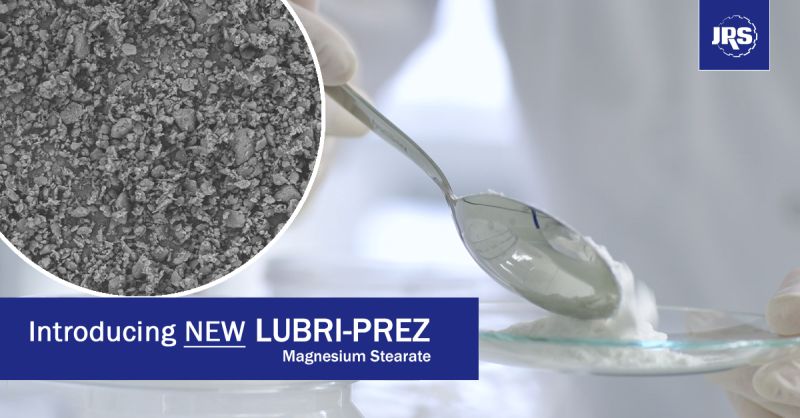Introduction to LUBRI-PREZ – the new Magnesium Stearate

Introduction
Lubricants play a critical role in the development process of tableting and capsule filling. For decades, magnesium stearate has been the most commonly used lubricant in pharmaceutical and nutraceutical tablet formulations, offering both functionality and cost-efficiency.
As a leader in excipient manufacturing, JRS PHARMA offers high-quality tablet lubricants, including LUBRITAB® (Hydrogenated Vegetable Oil) and PRUV® (Sodium Stearyl Fumarate). To further meet customers’ needs, JRS PHARMA’s extensive tableting excipient portfolio is now further extended to include LUBRI-PREZ Magnesium Stearate.
Get LUBRI-PREZ™ 4 here and LUBRI-PREZ™ 2 here
Grades
| Name of Grade | PSD Air Jet Sieve | PSD Malvern | Specific Surface Area | Stearic Acid |
|---|---|---|---|---|
| LUBRI-PREZ 2 | Max. 1% retained on 200# | D50 between 7.0 μm and 11.0 μm | 6-10 m2/g | Min. 60% |
| LUBRI-PREZ 4 | Max. 5% retained on 200# | D50 typically between 5.0 and 9.0 μm | 5-15 m2/g | Min. 40% |
LUBRI-PREZ is plant-derived and complies with major pharmacopeias (USP/NF, Ph.Eur.) as well as regulations for nutraceutical applications (FCC, E470b).
It is manufactured based on a stringent set of specifications at the EXCiPACT certified site of JRS PHARMA’sTM joint venture partner, Sudeep Pharma, in Gujarat, India
Functionality
The functionality of LUBRI-PREZ was tested in comparison with established brands of magnesium stearate on the markets.

Lubrication Efficiency
The main role of lubricants is the reduction of punch adhesion and die-wall friction. Measurement of the ejection force is a very significant parameter for the characterization of the lubrication efficiency.

Comparison of the ejection forces revealed the exact same lubrication efficiency for the four grades of magnesium stearate tested.
Effect on Tablet Hardness
A common side-effect of magnesium stearate is the tendency to occupy binding sites in the powder blend, thereby reducing the overall tabletability and tablet hardness. This effect is aggravated by prolonged blending times.

Figure 2 shows the compaction profiles for the four tested grades. LUBRI-PREZ exhibited equivalent behaviour as the two grades used for comparison.
Effect on Disintegration Time
Due to its hydrophobic nature, magnesium stearate also affects the ingress of water into the tablet matrix. As a result, the use of magnesium stearate as a lubricant may lead to longer disintegration times.

All four formulations showed a moderate increase in disintegration time with increasing tablet hardness. Only minor differences were observed between the four different grades of magnesium stearate.
Conclusion
LUBRI-PREZ was found to be functionally equivalent to the tested countertypes. Consistent performance in this regard is ensured by relevant powder parameters as listed in the technical advantages section below.
Get LUBRI-PREZ™ 4 here and LUBRI-PREZ™ 2 here
Technical Advantages of LUBRI-PREZ
- Tightly specified PSD
- Clearly defined specific surface area
- Specified, reproducible bulk density
Regulatory
- Complies with Ph. Eur., USP/NF, E470b and FCC
- GRAS listed
- Available certificates:
- Kosher
- Halal
- EXCiPACT™
- ISO 9001


